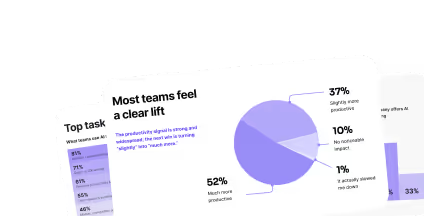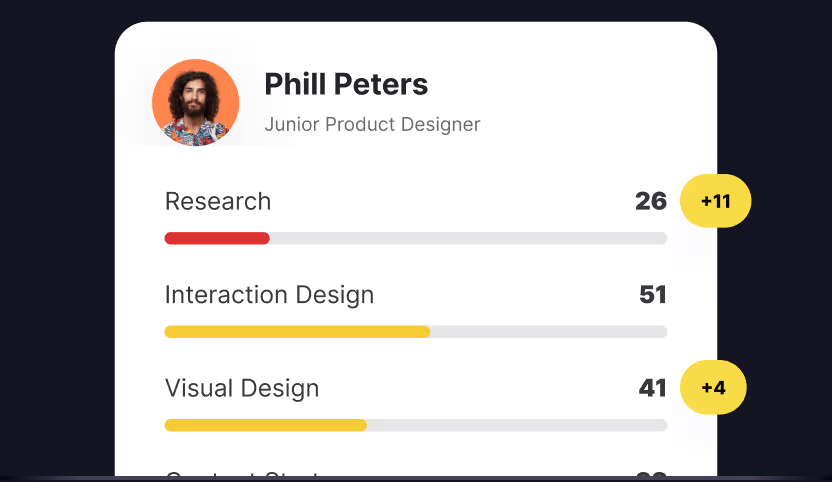Meet Mike: Product design lead at E.ON Next
As Product Design Lead at E.ON Next, I oversee a diverse team of nine professionals spanning product design, UX/UI design, and UX research disciplines. With 24 years of experience in the field, I've witnessed the remarkable evolution of digital design and understand the challenges of keeping pace with rapidly changing best practices.
E.ON Next stands as a leading energy provider in the UK, serving over 5.8 million customers with a steadfast commitment to sustainability. Our company has achieved the fastest migration in the industry, fueled by innovative digital solutions that have earned recognition through numerous prestigious awards. We pride ourselves on delivering customized energy solutions for digitally oriented customers, continuously driving toward a more sustainable future.

The challenge: Scaling design excellence in a fast paced environment
When evaluating our team's professional development approach, I identified several critical obstacles preventing us from reaching our full potential:
Limited visibility into skill capabilities: Previously, I attempted to map team skills using Excel spreadsheets, but this approach failed to capture the nuanced growth areas and accomplishments beyond my direct observations.
Prohibitive training costs: Quality UX/UI training traditionally comes with significant expense. Conference attendance rarely addressed our specific challenges, while online research typically yielded isolated solutions rather than comprehensive skill development.
Keeping pace with rapid industry evolution: The accelerating pace of change in digital design makes staying current increasingly difficult. We needed an efficient method to access current learning materials that could keep our team at the forefront of emerging technologies, trends, and best practices.
In an organization experiencing unprecedented growth and serving millions of customers through digital touchpoints, these limitations created a genuine barrier to scaling our design capabilities. Without a systematic approach to professional development, we risked compromising both team satisfaction and ultimately, customer experience.
The transformation: Four strategic advantages unlocked with Uxcel Teams
Implementing Uxcel Teams fundamentally transformed our approach to design excellence at E.ON Next, creating immediate value and long term strategic advantages.
1. Significant time efficiency
The concentrated nature of Uxcel's learning library delivered remarkable time savings for our team. Designers now gain precise, actionable insights with just 10 to 15 minutes of focused learning time, allowing them to immediately apply new knowledge to active projects.
This microlearning approach fits naturally into our fast paced work environment, enabling continuous skill development without disrupting productivity. The ability to learn in short, focused sessions has transformed professional development from an occasional event into a sustainable daily practice.
2. Exceptional cost effectiveness
While Uxcel involves a monthly investment, it has generated substantial cost savings compared to traditional training approaches. Conference attendance, often costing $800+ per participant with minimal practical value, has been largely replaced by targeted learning through the platform.
A notable example was our accessibility initiative, where Uxcel's comprehensive course enabled our team to align with organizational commitments to make sites and applications more accessible. The knowledge gained was efficiently transferred across the team and applied to multiple projects, delivering significantly higher ROI than isolated conference attendance or expensive specialized training.
3. Enhanced design communication
Within just 30 days of implementation, our junior and mid level designers demonstrated measurable improvement in their design terminology and communication capabilities. Uxcel's comprehensive resources established a shared language that enhanced engagement across multiple dimensions:
More engaging project participation: Team members contribute more confidently to discussions, bringing fresh perspectives informed by industry best practices.
Accelerated design output: Clearer communication has streamlined our design process, reducing revision cycles and accelerating time to completion.
More persuasive stakeholder presentations: Enhanced terminology has improved our ability to articulate design decisions to both internal stakeholders and development team partners.
This communication improvement has transformed cross functional relationships, positioning design as a more strategic voice within the organization.
4. Comprehensive skill visualization
Uxcel Teams provides unprecedented visibility into our team's capabilities, offering a detailed overview of individual and collective strengths, growth opportunities, and competency patterns. This visualization enables targeted assignment of learning content specifically calibrated to drive skill development where it matters most.
The data driven approach has transformed how we approach team development, moving from subjective assessment to objective skill measurement. This clarity allows for more strategic resource allocation, project staffing, and professional development planning.
Here's how E.ON Next team improved their design skills after just 30 days of using Uxcel
Strategic insights for design leaders
Based on our experience transforming E.ON Next's approach to design excellence with Uxcel Teams, I offer two key recommendations for fellow design leaders:
1. Prioritize self reflection and actionable growth
Motivate your team to embrace self reflection as a catalyst for growth. Skill assessments provide profound insights not only for managers but for designers themselves. By enabling self assessment and comparison against industry benchmarks, you create powerful opportunities for genuine professional development.
The ability to reassess skills at regular intervals transforms static evaluation into a dynamic growth journey. This approach enables designers to create actionable plans and meaningful goals that drive continuous improvement rather than occasional advancement.
2. Embrace streamlined, data driven training
Traditional approaches to skill mapping often fail to capture the real challenges designers face. By leveraging Uxcel's integrated system of challenges, lessons, courses, and assessments to generate comprehensive skill graphs, design leaders can finally approach professional development with the same rigor and structure that development teams have long enjoyed.
This platform addresses a significant industry gap, providing the streamlined, tailored training that design teams need to thrive in rapidly evolving digital environments. By focusing on actual capabilities rather than perceived skills, leaders can make more informed decisions about team structure, project assignments, and growth investments.
The broader transformation: Design as strategic advantage
The implementation of Uxcel Teams has fundamentally changed how E.ON Next approaches design excellence and professional development. What began as an initiative to better understand team capabilities has evolved into a strategic advantage that enhances our ability to serve customers through exceptional digital experiences.
Our design team now operates with greater confidence, clearer communication, and more consistent quality standards. The culture of continuous learning has fostered innovation while establishing design as a more influential voice within our organization. Most significantly, the data driven approach to skill development has created unprecedented visibility into our human capital capabilities, allowing for strategic resource allocation and career development.
By transforming how we approach learning, Uxcel Teams has enabled E.ON Next to build not just better products, but better design professionals. This focus on human capital excellence creates sustainable competitive advantage that complements our organizational commitment to innovation and customer centricity.





.svg)
.svg)
.svg)
.svg)
.svg)
.svg)
